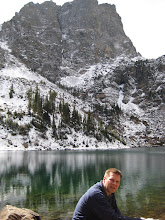Now that I have gotten back into running after the ailment, I've been thinking about this theory that I have.
Everything is more difficult in the winter. For example, gas mileage in cars suffer in the cold, because oil gets thicker and the engine works harder.
As a runner, I am much slower in the winter, and I think it is more than the treacherous footing and the 12 layers of clothes required to run through a Wisconsin February. I think that running in cold weather is just plain harder, and that if you can persevere to May, you will be tougher.
I've read that capillaries constrict when it is cold. Therefore the heart must work harder to do the same amount of work to get the blood into the muscles. Common sense would tell me that in order to adapt, the heart must get stronger. And if gas mileage goes down, a human body must burn more calories to go, too. This is what I tell myself when I am slogging through my gray morning run. I tell myself I am getting tougher, stronger, and burning more calories. And when things thaw, I am going to be a monster.
In the course of my job, I get to talk to a lot of different people, and many of these people are smart. This week, I've talked to exercise and heart experts, so I asked them about my theory.
Corey Huck, an assistant professor at the School of Health Promotion and Human Development at the University of Wisconsin-Stevens Point, wasn't buying it. A body acclimatizes to cold and heat, he said. There is a constriction of arteries, it's true,but that's in skin exposed to the cold, he said. A runner wearing proper clothing wouldn't experience it.
His theory is that I'm actually warmer when I run in the winter. Because I'm wearing layers (and a hat on my head), evaporation of sweat doesn't take place, and my body can't cool down as well as it can in the summer, when I'm wearing shorts and t-shirt that allow my sweat to evaporate away, and cool me down. So ironically, I'm overheating when I'm running in the cold, and it may be that that's slowing me down.
However, Dr. Paul Luetmer, a cardiologist for Cardiovascular Associates in Wausau, and the medical director for the Aspirus Heart and Vascular Institute, thinks I might have a point. "Cold air can cause coronary constriction," Luetmer said, and exercising in the cold can put more stress than usual on a person's cardiovascular system. That's why people who aren't fit can get into heart trouble in the winter, like "having the proverbial heart attack while shoveling," Luetmer said.
But that's good news for fit people who want to get fitter.
That means that I can feel superior to runners from California,those poor souls who never get to adapt to the frigid weather.
But running in the cold probably isn't as effective as running at altitude. When a person trains at high elevations where oxygen levels are low, a whole slew of adaptations take place, including changes in the blood and muscles, all of which allows oxygen to get to muscles in a more efficient manner.
That means I should feel drastically inferior to people from Colorado, who have both altitude and cold working for them.
Tuesday, February 9, 2010
Subscribe to:
Post Comments (Atom)

No comments:
Post a Comment